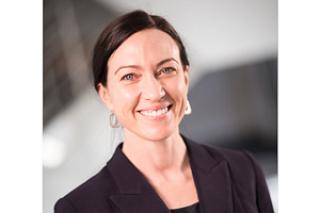Breadcrumb
Dr. Anna R. Docherty is a quantitative geneticist and a clinician examining risk and resilience in the context of severe outcomes, including psychosis and suicide. Her valuable work provides essential contributions to our understanding of health outcomes in emerging adults.
As part of the incredible network of professionals at the University of Utah Huntsman Mental Health Institute, we were pleased Dr. Docherty could share a bit of her story and what brought her to Utah.
"Most of all, I want to make a difference for people and families who would benefit from education about mental health or who feel stigmatized because they struggle with mental health concerns."
Anna Docherty, PhD, LP
What was it that led or inspired you to become a clinical psychologist and researcher?
I was a problem child! Not really, but I did have challenges as a kid — my father left the picture when I was young, and I was an angry, rebellious teen with an ax to grind. Luckily, over time, with the right environment and support from a great family, I started to feel better by helping others feel less alone and develop their social support networks. I like connecting people to one another. My stepdad lives those values, and I was lucky he came along. I later became passionate about neuroscience, and fell in love with the puzzle of psychiatry and genetics.
What are your areas of specialization and why?
I take a really, really “big picture” approach to psychiatry. Unlike other areas of medicine, we don't have straightforward labs or other tests that can tell us our afflictions. We have to gather tons of information and make our best guess, and then try medication and therapy that we think will help. This makes it hard to treat people and to decrease stigma — we tend to stigmatize what we don't understand. Huge genetic studies that tell us how different conditions relate to one another and point to drug targets have helped meet this challenge. It's not simple — thousands of studies are required, and our number-crunching has had to become more sophisticated. So, I guess I specialize in demystifying psychiatry with big data and statistics and improving our diagnostic practices.
On the flip side, I like to hone in on our patients needing better representation and support. I specialize in clinical intervention for people who are transitioning, people who feel alienated in their communities, teens struggling with emerging adulthood during a difficult time, and people struggling with issues of faith.
What type of impact do you hope to make with your research?
Most of all, I want to make a difference for people and families who would benefit from education about mental health, or who feel stigmatized because they struggle with mental health concerns. I hope the research we're doing can be communicated well and provide hope. The clinical, lifespan, and genetics work we're doing at HMHI significantly improves our future healthcare. Also, talking about this work publicly helps people learn about how common and treatable their mental health struggles may be. I hope to make an impact by getting more families to seek the proper treatment and participate in research to help our community.
What is the most challenging part of your job?
Right now, the biggest challenge is reaching the communities I want to help most — communities that are underrepresented in medicine. We now have several projects aimed at reaching individuals in Utah who are underserved, and I'm learning a lot from the complexity of this work. And also, it's a challenge to reach people who are isolated and more at risk — many of them are men who feel stigma when thinking about getting help.
What is the most interesting and/or rewarding part of your job?
I love treating patients, making an immediate impact, running studies that inform mental healthcare, and then going for a run in the canyons (for my own mental health), all in a typical workday.
Why did you decide to come to Utah?
I came to Utah in 2016 because the resources here are perfectly aligned with the impact I want to make on mental healthcare. And the people doing research here had such complementary interests to my own. I've since felt like I'm part of a big growing family in our department — we're closely knit, take care of each other, and are passionate about collaborative team science.
Anna R. Docherty has a Ph.D. in clinical psychology from the University of Missouri-Columbia. Her current focus is on enhancing clinical prediction of severe psychopathology and suicide risk during emerging adulthood (e.g., in college students) and developing early detection and intervention methods using genetic data.
Dr. Docherty is a dedicated community educator, mental health advocate and clinician. She directs an outpatient clinic at HMHI focused on evidence-based group, family, and individual psychotherapies for the management of depression, anxiety, and psychosis.
